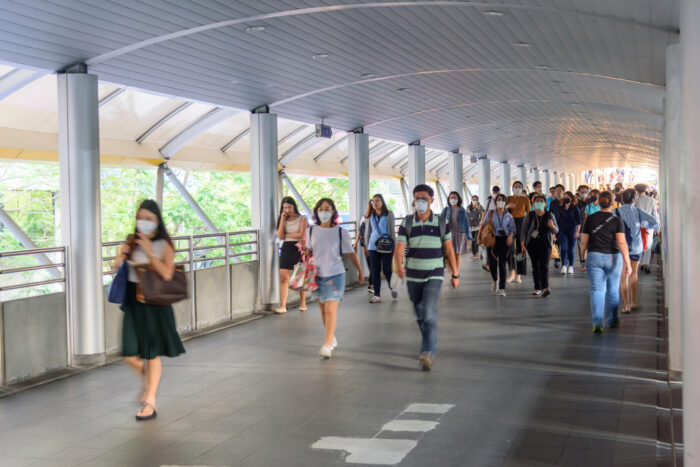Wage subsidies of RM20.63 billion disbursed in Malaysia

To preserve 2.96 million local jobs, the government has disbursed RM20.63 billion (US$4.9 billion) in wages subsidies as of March 18 this year.
Government called to upskill and reskill workers in the Philippines

To reduce job mismatches, the government needs to have in place more training programmes so that workers can keep pace with digital transformation.
Australia sees more jobs vacancies than before the pandemic

There were 423,000 job vacancies in February this year, up from the about 200,000 in the same month two years ago.
Vietnam raises the number of overtime hours

The National Assembly has passed a Resolution to increase overtime working hours from the current 40 hours to 60 hours per month.
Earning power of freelancers and self-employed in Japan falls

About 37% of freelance workers surveyed expect their incomes to be lower than before the pandemic going forward.
New Zealand introduces Fair Pay Agreements Bill

The Fair Pay Agreements Bill has been introduced to Parliament to lift incomes and improve working conditions, especially of medium and lower earners.
Employers in Singapore must consider flexi-work arrangements

Under a new set of government guidelines, by 2024, employers must consider staff requests for flexible work arrangements fairly and properly.
Malaysia lets employers choose whether to allow WFH

As the country moves into the endemic stage on April 1, employers will get to decide whether to continue work-from-home (WFH) or hybrid arrangements.
Singapore’s guidelines on fair employment practices to become law

A White Paper has proposed that the Tripartite Guidelines on Fair Employment Practices be enshrined in law.
Thailand to review minimum wage increase

Amid rising costs of living, the National Wage Committee is expected to hold a meeting to consider the proposal to increase the daily minimum wage.
Some employees in the Philippines unwilling to return to workplaces

One fifth of business processing outsourcing (BPO) workers would rather quit their jobs than return to offices.
Majority of South Korean workers see value in their jobs

About 73.2% of respondents said they see value in what they do for a living in a survey conducted last year.
Australia’s budget aims to lift wages to highest level since 2013

Treasurer Josh Frydenberg has promised that the federal budget will lead to an increase in real wages in the coming financial year.
Flexible work policies for government workers in the Philippines

In a move that could potentially herald the 4-day work week, the Civil Service Commission (CSC) will be issuing a policy for flexible work.
Singapore allows more employees to return to office

Three out of four staff who may currently be working from home will be allowed to return to their workplaces from March 29.
Workers in Vietnam’s HCMC receive sickness benefit

COVID-infected employees and those leaving their work to take care of infected children under seven years old have received sickness benefits.
Return to office trending in the Philippines

Several major business groups and companies are backing the government’s move to get employees to return to their workplaces.
Hong Kong’s unemployment drops in February quarter year-on-year

The seasonally adjusted unemployment rate fell to 4.5% in the period from December 2021 to February 2022, from 7.2% in the same period the year prior.
Malaysia approves amendments to Employment Act

The Employment (Amendment) Bill 2021 enhances protection against discrimination, safeguards well-being, and offers flexible work options for workers.
Singapore to release final tranche of wage subsidies

By the end of March, more than 99,000 employers will receive S$840 million (US$619 million) under the Wage Credit Scheme (WCS).
Unemployment rate lowest since January 2020 in the Philippines

The unemployment rate in January was 6.4%, the lowest in two years or since the 5.3% in January 2020 before the pandemic began.
Thailand plots roadmap to gender equality in business

This aims to increase women’s empowerment in the workplace and Thailand’s progress towards sustainable socio-economic development.
4-day workweek to be decided by companies in the Philippines

Instead of the government issuing a blanket four-day workweek mandate, companies will decide whether to adopt this practice themselves.
Workplace harassment to be compensated in South Korea

Under the revised Accident Compensation Act for Public Servants, sickness and death caused by workplace harassment will be compensated.
DOLE calls for 3 months of wages subsidy in the Philippines

A wage subsidy worth P24 billion (US$459 million) has been proposed to counter the impact of rising oil prices on workers.
Companies in Japan no longer need to identify COVID-19 close contacts

The central government will no longer require companies to identify employees who have had close contacts with coronavirus patients.
Casual workers in Victoria state to get 5 days paid sick leave

Victoria will be the first state in Australia to push out a trial to grant five days of paid sick and carer’s leave annually to casual workers.
China targets to create 13 million jobs this year

“Pro-job policies”, including tax and fee cuts totaling US$400 billion for businesses, especially small entrepreneurs, are planned.
Record number of Australians working multiple jobs

A record 850,000 Australians were working multiple jobs in the last quarter of 2021, an increase of almost 100,000 quarter-on-quarter.
Hong Kong provides protection for workers under quarantine

A proposed amendment to the employment law will ensure that workers undergoing isolation or quarantine can enjoy sick leave.

